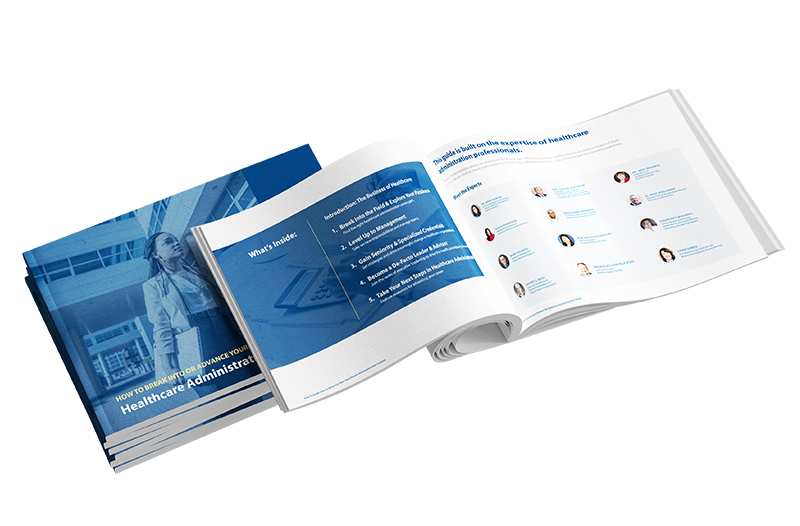Request Information
We're Sorry
There was an unexpected error with the form (your web browser was unable to retrieve some required data from our servers). This kind of error may occur if you have temporarily lost your internet connection. If you're able to verify that your internet connection is stable and the error persists, the Franklin University Help Desk is available to assist you at helpdesk@franklin.edu, 614.947.6682 (local), or 1.866.435.7006 (toll free).
Just a moment while we process your submission.

What is a Healthcare Administration Degree?
In today's healthcare environment, there's an increasing demand for skilled professionals who can effectively manage the complex operations of healthcare organizations.
This is where a bachelor's degree in healthcare administration can come into play. But what exactly is this degree, and how can it benefit your career?
Simply put, a healthcare administration degree is a comprehensive program designed to equip you with the knowledge and skills necessary to navigate the intricacies of healthcare management. It covers a wide range of topics, from healthcare policy and finance to management principles and organizational behavior.
By developing your skills in these crucial areas, you'll be well-positioned to contribute to both healthcare delivery and management.
What Does a Healthcare Administrator Do?
Dr. Mary Bynum, program chair of healthcare administration at Franklin University, says that healthcare administrators play a valuable role in shaping the delivery of healthcare services. She notes that your responsibilities will be diverse and impactful, touching on various aspects of healthcare operations, including the following.
Overseeing Healthcare Facilities
One of your primary responsibilities will be managing the day-to-day administrative operations of healthcare facilities. You'll be responsible for streamlining organizational efficiency, which will help ensure both staff and patients have a seamless clinic experience.
In addition to daily operations, you'll also be involved in long-term planning. This includes developing strategic plans for facility expansion, implementing new services or improving existing ones.
Managing Staff and Resources
As a healthcare administrator, you'll be responsible for coordinating personnel, budgets and equipment efficiently.
You'll need to ensure your facility is adequately staffed to meet patient needs while effectively managing labor costs. With this in mind, your administrative responsibilities will also include overseeing budgets, running labor statistics, allocating funds to different departments and making decisions about equipment purchases and facility upgrades.
Ensuring Regulatory Compliance
The healthcare industry is heavily regulated, and staying compliant with these regulations will be a significant component of your job. This includes everything from patient privacy laws to safety regulations and insurance requirements.
When new regulations are introduced, you will be responsible for implementing the necessary changes within your organization. This might involve updating policies and procedures, training staff on new requirements or implementing new systems to ensure compliance.
Improving Patient Care Quality
Healthcare administrators work to provide and improve patient care quality. In this role, you'll be responsible for developing and monitoring quality assurance programs. This involves setting standards for patient care, implementing processes to measure and improve care quality and addressing any issues that arise.
You'll work closely with medical staff to ensure patients receive the best care possible. This might include implementing new treatment protocols, investing in advanced medical technologies or helping to develop programs that improve patient satisfaction and outcomes.
Advance your career in Healthcare Administration while you advance patient care. Download your free career guide.
Key Areas of Focus With a Healthcare Administration Degree
A healthcare administration degree is broad and comprehensive, encompassing several key areas. Understanding them will give you a clearer picture of what you'll study and the skills you'll develop during your program.
Healthcare Policy and Regulation
Understanding policies, regulations and compliance in healthcare settings is paramount for any healthcare administrator.
You'll need to stay ahead of fluctuating healthcare laws at local, state and federal levels to ensure your organization operates within legal boundaries and maintains its accreditation. In addition, learning to interpret policy changes and assess their implications for your organization will allow you to adapt strategies and operations accordingly.
- Projected Skill Growth: +19.8% through 2032
Financial Management
Financial management is all about budgeting, reimbursement systems and cost-control strategies.
Financial analysis and planning for healthcare organizations will also be a key part of your skill set. You'll learn to interpret financial reports, conduct cost-benefit analyses and develop long-term financial strategies to ensure the financial health of your organization.
- Projected Skill Growth: +27.3% through 2032
Healthcare Informatics and Technology
As a healthcare administrator, you'll need to understand how to leverage informatics and technology to improve patient care, streamline operations and inform decision-making.
Implementing and managing electronic health records (EHRs) and other health IT systems will likely be a significant part of your role. In addition, you'll also learn about the latest healthcare technologies and how to integrate them effectively into your organization's operations.
- Projected Skill Growth: 25.8% through 2032
Leadership and Organizational Behavior
Developing skills to manage teams and drive organizational success is an important part of healthcare management and health administration.
You'll learn about different leadership styles, how to motivate teams and strategies for managing change in healthcare settings. Understanding organizational behavior and leadership principles in healthcare settings will also help you improve staff satisfaction and enhance patient care.
- Projected Skill Growth: +8.5% through 2032
Operations Management
Overseeing daily operations in healthcare facilities is a core responsibility of healthcare administrators.
You'll learn how to optimize workflows, manage resources efficiently and ensure smooth day-to-day functioning of your organization. Managing staff and resources to maximize efficiency is a high priority in the often resource-constrained healthcare environment, so developing these skills at a high level is important for success.
- Projected Skill Growth: +8.1% through 2032
*Souce: Lightcast™ 2024
.png)
Health Administration: Career Opportunities in the Healthcare Industry
As a healthcare administrator, you'll find doors opening to various roles across the healthcare sector. Here are some potential career paths you might consider.
- Hospital Administrator. Oversee the day-to-day operations of a hospital or healthcare system.
- Advertised Median Salary: $106,350
- Projected Growth (through 2023): +13.7%
- Clinic Manager. Monitor and manage the operations of a medical clinic or group practice. Also known as health services managers.
- Advertised Median Salary: $109,741
- Projected Growth (through 2023): +39.1%
- Healthcare Consultant. Provide expert advice to healthcare organizations on improving efficiency and quality of care.
- Advertised Median Salary: $83,685
- Projected Growth (through 2023): +28.1%
- Health Information Manager. Oversee the management and security of patient health information.
- Advertised Median Salary: $110,680
- Projected Growth (through 2023): +26.5%
- Quality Improvement Manager. Lead initiatives to improve patient care quality and safety.
- Advertised Median Salary: $81,330
- Projected Growth (through 2023): +14.2%
*Souce: Lightcast™ 2024
Learn more about what job opportunities you can pursue with a healthcare administration degree!
Why Choose a Healthcare Administration Degree?
Dr. Bynum emphasizes that health administration degrees can offer the skills and experience to help you move into a lucrative and rewarding long-term career. However, she also notes that you shouldn't move into any kind of healthcare management education without a game plan.
“Take inventory of what's important to you. It’s crucial to understand how you plan to leverage your degree, what organization and/or industry you see yourself working in and what specific position you’d like to occupy as you move into the future,” Bynum says.
With this in mind, here are some compelling reasons to pursue a health administration degree.
- Career Opportunities. A health administration program opens doors to various career paths, including hospital administration, medical group management, health informatics and more. With a degree, you'll have the skills and knowledge to excel in various roles within the healthcare sector.
- Job Security. The demand for healthcare administrators is increasing due to the growing need for quality healthcare services. According to Lightcast, with a predicted job growth of 16% through 2032, those with a bachelor's or master's degree in this field will be especially attractive to potential employers.
- Flexibility. Healthcare administration offers flexibility in work settings, with options to work in hospitals, clinics, private practices or nonprofit organizations. You can also specialize in a specific area, such as long-term care, healthcare systems or public health.
- Personal Fulfillment. Healthcare administrators can positively impact people's lives by improving healthcare services and outcomes. By joining this profession, you'll be part of a dynamic and rewarding field that aligns with your passion for helping others.
- Competitive Salaries. Those in the healthcare administration field are typically well-compensated, with Lightcast estimating an advertised median salary of $70,600 depending on experience and level of education.
.png)
Take the Next Step in Your Healthcare Career
Franklin University's B.S. in Healthcare Administration program offers a unique blend of classroom instruction and clinical experience that will prepare you for a wide range of roles in the healthcare industry.
With an expert faculty, state-of-the-art facilities and a comprehensive curriculum, Franklin will give you the skills and expertise you need to succeed.
Don't miss out on this opportunity to take your career to new heights. Get more information today or apply when ready and start building the rewarding future you want.
.png)





